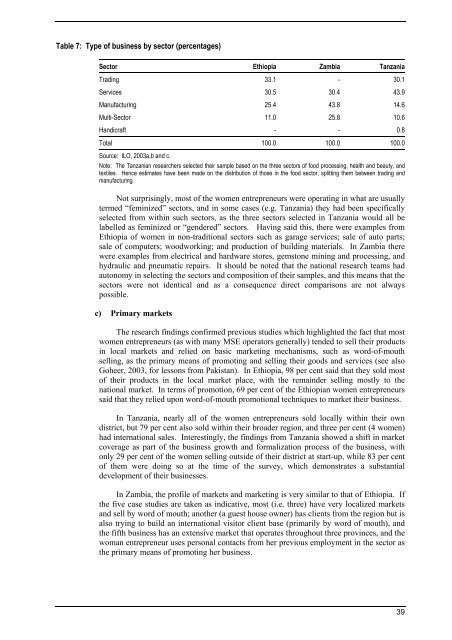The Challenges of Growing Small Businesses - International Labour ...
The Challenges of Growing Small Businesses - International Labour ...
The Challenges of Growing Small Businesses - International Labour ...
You also want an ePaper? Increase the reach of your titles
YUMPU automatically turns print PDFs into web optimized ePapers that Google loves.
Table 7: Type <strong>of</strong> business by sector (percentages)<br />
Sector Ethiopia Zambia Tanzania<br />
Trading 33.1 - 30.1<br />
Services 30.5 30.4 43.9<br />
Manufacturing 25.4 43.8 14.6<br />
Multi-Sector 11.0 25.8 10.6<br />
Handicraft - - 0.8<br />
Total 100.0 100.0 100.0<br />
Source: ILO, 2003a,b and c.<br />
Note: <strong>The</strong> Tanzanian researchers selected their sample based on the three sectors <strong>of</strong> food processing, health and beauty, and<br />
textiles. Hence estimates have been made on the distribution <strong>of</strong> those in the food sector, splitting them between trading and<br />
manufacturing.<br />
Not surprisingly, most <strong>of</strong> the women entrepreneurs were operating in what are usually<br />
termed “feminized” sectors, and in some cases (e.g. Tanzania) they had been specifically<br />
selected from within such sectors, as the three sectors selected in Tanzania would all be<br />
labelled as feminized or “gendered” sectors. Having said this, there were examples from<br />
Ethiopia <strong>of</strong> women in non-traditional sectors such as garage services; sale <strong>of</strong> auto parts;<br />
sale <strong>of</strong> computers; woodworking; and production <strong>of</strong> building materials. In Zambia there<br />
were examples from electrical and hardware stores, gemstone mining and processing, and<br />
hydraulic and pneumatic repairs. It should be noted that the national research teams had<br />
autonomy in selecting the sectors and composition <strong>of</strong> their samples, and this means that the<br />
sectors were not identical and as a consequence direct comparisons are not always<br />
possible.<br />
c) Primary markets<br />
<strong>The</strong> research findings confirmed previous studies which highlighted the fact that most<br />
women entrepreneurs (as with many MSE operators generally) tended to sell their products<br />
in local markets and relied on basic marketing mechanisms, such as word-<strong>of</strong>-mouth<br />
selling, as the primary means <strong>of</strong> promoting and selling their goods and services (see also<br />
Goheer, 2003, for lessons from Pakistan). In Ethiopia, 98 per cent said that they sold most<br />
<strong>of</strong> their products in the local market place, with the remainder selling mostly to the<br />
national market. In terms <strong>of</strong> promotion, 69 per cent <strong>of</strong> the Ethiopian women entrepreneurs<br />
said that they relied upon word-<strong>of</strong>-mouth promotional techniques to market their business.<br />
In Tanzania, nearly all <strong>of</strong> the women entrepreneurs sold locally within their own<br />
district, but 79 per cent also sold within their broader region, and three per cent (4 women)<br />
had international sales. Interestingly, the findings from Tanzania showed a shift in market<br />
coverage as part <strong>of</strong> the business growth and formalization process <strong>of</strong> the business, with<br />
only 29 per cent <strong>of</strong> the women selling outside <strong>of</strong> their district at start-up, while 83 per cent<br />
<strong>of</strong> them were doing so at the time <strong>of</strong> the survey, which demonstrates a substantial<br />
development <strong>of</strong> their businesses.<br />
In Zambia, the pr<strong>of</strong>ile <strong>of</strong> markets and marketing is very similar to that <strong>of</strong> Ethiopia. If<br />
the five case studies are taken as indicative, most (i.e. three) have very localized markets<br />
and sell by word <strong>of</strong> mouth; another (a guest house owner) has clients from the region but is<br />
also trying to build an international visitor client base (primarily by word <strong>of</strong> mouth), and<br />
the fifth business has an extensive market that operates throughout three provinces, and the<br />
woman entrepreneur uses personal contacts from her previous employment in the sector as<br />
the primary means <strong>of</strong> promoting her business.<br />
39
















